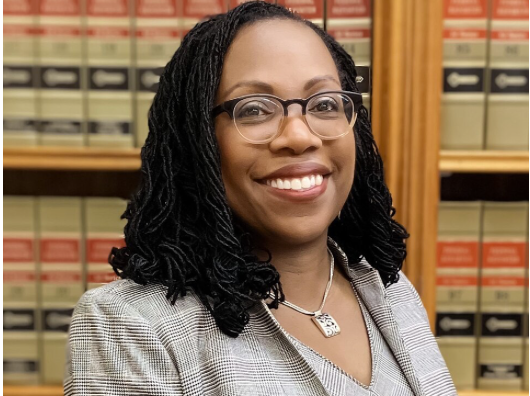About This Lesson
Judge Kitanji Onyika Brown Jackson who was confirmed Associate justice of the United States Supreme Court on April 4, 2022 - its first African American woman l joined an institution which for the first time in its 233 year history did not have a white male majority of justices. She replaced Justice Stephen Breyer, whom she clerked for, when he retired in July of that year.
The confirmation process was most contentious. 47 Republican Senators walked out of the chamber after a 53-47 vote to confirm was passed. Even President Biden noted in his remarks at a ceremony on the White House lawn on April 7, “I knew the person I nominated would be put through a painful and difficult confirmation process. But I have to tell you, what Judge Jackson was put through was well beyond that — the verbal abuse, the anger, constant interruptions, the most vile, baseless assertions and accusations. In the face of it all, Judge Jackson showed the incredible character and integrity she possesses.”
Judge Jackson was subjected to what could easily qualify as a Literacy Test of the Jim Crow era, when she was asked to define ‘woman’ by Republican Senator Marsha Blackburn from Tennessee. “Can you provide a definition for the word ‘woman’? She asked. To which Judge Jackson replied “I am not a biologist.”
Just after slavery ended in 1865 (via the 13th Amendment), states began passing laws to keep the races segregated and to prevent African Americans from voting as well as placing severe limitations on African Americans. According to the History.com website Black Codes or Jim Crow laws “for about 100 years, from the post-Civil War era until 1968—were meant to marginalize African Americans by denying them the right to vote, hold jobs, get an education or other opportunities. Those who attempted to defy Jim Crow laws often faced arrest, fines, jail sentences, violence and death.”
A Literacy test was one of the devices used to prevent African Americans from voting. Some poor white people were subjected to this method of exclusion. One single wrong answer or if the official administering the test ruled your answer is incorrect, you failed. That was final.
Testing depended solely on the official administering the test. According to Thirteen.org; “Despite being intelligent and well educated, you could not pass the test for the simple reason that the test was created with failure as the goal. Even if you know the correct answers to all 68 questions, the official administering the test might still decide that you have failed.” And this may have been exactly why Senator Blackburn asked that question – knowing that it can be answered in different ways. When Judge Jackson responded, “I am not a biologist” Blackburn who appeared to have had her reaction prepared, responded, “The fact that you can’t give me a straight answer about something as fundamental as what a woman is underscores the dangers of the kind of progressive education that we are hearing about.”
Judge Brown’s record revealed that she had become the most qualified justice, in the history of the Supreme Court, when she took up her seat as the court’s 116 Associate Justice, had come under attack from other Republican Senators on the judicial committee. Ted Cruz of Texas, an academically brilliant classmate of Judge Jackson at Harvard Law School wanted to know if babies are racist. Lindsey Graham of South Carolina who disqualified Jackson even before the hearing because his candidate from South Carolina did not get the nomination from the President, wanted to know Jackson’s church denomination, how often she goes to church, and how faithful she was. She was not questioned about her unblemished family life or impeccable moral life.
In 2002 Lindsay Graham who may have been speaking to his base, replaced Senator Strom Thurmond who on August 28-29, 1957 made the longest filibuster speech in the Senate - 24 hours and 18 minutes in which he said inter alia, “There is not enough troops in the army, to force the southern people to break down segregation and admit the ni- - er in our theaters, into our swimming pools, into our homes, and into our churches.” Thurmond did never told the senate or the nation that he fathered a child with an African American woman.
Judge Brown became the most qualified in terms of her academic qualifications and experience in the over 233 year history of the court. She became the court’s first and only experienced public defender in the history of the court which had 115 white men, 4 women, 2 African American men and one Latina. She was who born in Washington DC to parents who were born in Florida in the Jim Crow era south, said she presided over thousands of cases and wrote hundreds of opinions (She authored over 560 judicial decisions.) during the previous ten years. She graduated magna cum laude from Harvard University, and cum laude from Harvard Law School. She was in private practice; judge on the US Court of Appeals for the District of Columbia Circuit; judge on the US District Court for the District of Columbia; vice chair of the US sentencing Commission; federal public defender; Supreme Court Clerk for Justice Stephen Breyer, whom she replaced.
She paid tribute to her role model Constance Baker Motley, both of whose birthdays is September 14 and on whose shoulders she stands. Motley had a stellar life and career. She wrote the original brief for Brown v. Board of Education (1954), she was first black woman to argue a case before the US Supreme Court. She won 9 out of 10 (90 percent) landmark civil rights cases she argued before the court. At one time she was the only woman lawyer active in the NAACP. Her 90 percent wins include Hamilton v. Alabama (1961), Meredith v. Fair (1962), Watson v. City of Memphis (1963), and Bouie v. City of California (1964). In addition Motley assisted with some 60 other Civil Rights cases. She was also the first woman to serve as Manhattan Borough President and first African American woman to serve as Senator in the NY State Senate.
Judge Jackson received unqualified recommendations from numerous organizations and individuals. “Her outstanding academic credentials, integrity and commitment to following the facts, impartiality, fairness, and the rule of law are the qualities essential to serving on the supreme court” wrote 83 Republican and Democratic former Attorneys General. The Fraternal Order of Police wrote “There is little doubt she has the temperament, intellect, legal experience and family background to earn this appointment.”
Neil Katyal former acting US Solicitor General tweeted: “She is an outstanding jurist and person. Brilliant, fair, and a true and real person. She will be an immense credit to the court and country.”
Judge Kitanji Brown Jackson’s confirmation is a sign that America is in an era in which it has seriously begun to honor its ‘promissory note’ which the Rev. Martin Luther King Jr. referenced at his famous I Have A Dream Speech at the March on Washington for Jobs and Freedom on August 28, 1963, “in a sense we’ve come to our nation’s capital to cash a check.” After winning the fight, Judge Brown, the 116 Associate Justice said her confirmation was a move in one generation from segregation to the Supreme Court.












